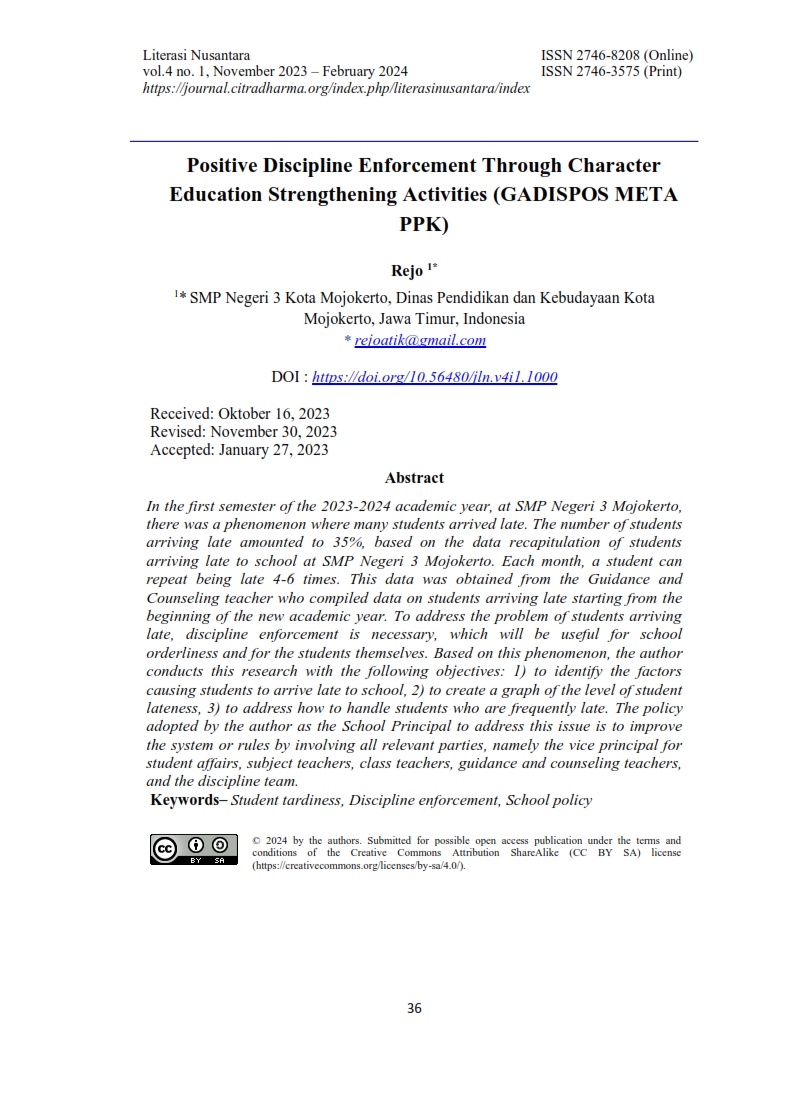Positive Discipline Enforcement Through Character Education Strengthening Activities (GADISPOS META PPK)
DOI:
https://doi.org/10.56480/jln.v4i1.1000
 Abstract View:
Abstract View:
86
 PDF downloads:
PDF downloads:
81
Keywords:
Student tardiness, Discipline enforcement, School policyAbstract
In the first semester of the 2023-2024 academic year, at SMP Negeri 3 Mojokerto, there was a phenomenon where many students arrived late. The number of students arriving late amounted to 35%, based on the data recapitulation of students arriving late to school at SMP Negeri 3 Mojokerto. Each month, a student can repeat being late 4-6 times. This data was obtained from the Guidance and Counseling teacher who compiled data on students arriving late starting from the beginning of the new academic year. To address the problem of students arriving late, discipline enforcement is necessary, which will be useful for school orderliness and for the students themselves. Based on this phenomenon, the author conducts this research with the following objectives: 1) to identify the factors causing students to arrive late to school, 2) to create a graph of the level of student lateness, 3) to address how to handle students who are frequently late. The policy adopted by the author as the School Principal to address this issue is to improve the system or rules by involving all relevant parties, namely the vice principal for student affairs, subject teachers, class teachers, guidance and counseling teachers, and the discipline team.
References
Abdussamad, Zuchri. (2021). Metode Penelitian Kualitatif. CV Syakir Media Press
Andriani, Ayu. (2022). Penguatan Profil Pelajar Pancasila Melalui Disiplin Positif (DISPOS). Pati: Maghza Pustaka
As' ari, H. (2022, December). Implementasi Penguatan Pendidikan Karakter di MIN 2 Gunung kidul. In Proceeding Annual Conference on Madrasah Teacher (Vol. 5, pp. 201-206).
Dakhi, Agustin Sukses. (2020). Kiat Sukses Meningkatkan Disiplin Siswa. Yogyakarta: Budi Utama
Dole, F. E. (2021). Pengaruh pendidikan karakter terhadap kedisiplinan peserta didik di sekolah dasar. Edukatif: Jurnal Ilmu Pendidikan, 3(6), 3675-3688.
Fadhilah, A. (2022). Pengaruh Reward Menggunakan Teknik Token Ekonomi dalam Meningkatkan Disiplin Anak Usia 5-6 Tahun di TK ABA 05 Medan Tahun Ajaran 2021/2022 (Doctoral dissertation, Universitas Negeri Medan).
Hidayat, U. S dan Rizki. M. R, (2016). Pendidikan Karakter di Sekolah. Jawa Barat: Yayasan Budhi Mulia Sukabumi
Indarwati, E. (2020). Implementasi penguatan pendidikan karakter siswa sekolah dasar melalui budaya sekolah. Media Manajemen Pendidikan, 3(2), 163-174.
Indonesia. (2018). Peraturan Menteri Pendidikan Dan Kebudayaan Republik Indonesia Nomor 20 Tahun 2018 Tentang Penguatan Pendidikan Karakter Pada Satuan Pendidikan Formal. Jakarta
Ismail, S., Suhana, S., & Zakiah, Q. Y. (2020). Analisis kebijakan penguatan pendidikan karakter dalam mewujudkan pelajar pancasila di sekolah. Jurnal Manajemen Pendidikan Dan Ilmu Sosial, 2(1), 76-84.
Kelas Menulis IGI NTT. (2019). Guru Kehidupan (Kumpulan Kisah Inspiratif). Guepedia
Kuriawan, W. A. (2018). Budaya Tertib Siswa Di Sekolah (Peguatan Pendidikan Karakter Siswa). Jawa Barat: Jejak
Kurniawan, M. R., & Rianto, S. (2021). Integrasi penguatan pendidikan karakter kedisiplinan di sekolah dasar dalam pembelajaran berbasis e-learning. Naturalistic: Jurnal Kajian dan Penelitian Pendidikan dan Pembelajaran, 5(2b), 872-882.
Musbiki, Imam. (2021). Pendidikan Karakter Disiplin. Nusa Media
Pangestu, I. P., Putra, N. L. J., Wardani, E. R., & Wardhanu, A. G. (2023). Pelaksanaan Program Pendidikan Karakter di SMP Negeri 25 Depok. Journal of Citizenship Values, 1(1), 18-25.
Permatasari, K. I. N., Sugiaryo, S., & Sarafuddin, S. (2023). Implementasi Tata Tertib Sekolah dalam Penguatan Pendidikan Karakter Disiplin Peserta Didik Kelas IV SD Negeri Gandekan Surakarta Tahun Pelajaran 2022/2023. Jurnal Pendidikan Tambusai, 7(2), 18002-18007.
Prasetiya, B., & Cholily, Y. M. (2021). Metode Pendidikan karakter Religius paling efektif di sekolah. Academia Publication.
Purandina, I. P. Y., & Winaya, I. M. A. (2020). Pendidikan karakter di lingkungan keluarga selama pembelajaran jarak jauh pada masa pandemi COVID-19. Cetta: Jurnal Ilmu Pendidikan, 3(2), 270-290.
Rizkita, K., & Saputra, B. R. (2020). Bentuk penguatan pendidikan karakter pada peserta didik dengan penerapan reward dan punishment. Pedagogi: Jurnal Ilmu Pendidikan, 20(2), 69-73.
Rohmah, N., Hidayat, S., & Nulhakim, L. (2021). Implementasi Pendidikan Karakter Disiplin dalam Mendukung Layanan Kualitas Belajar Siswa. Jurnal Ilmiah Pendidikan dan Pembelajaran, 5(1), 150-159.
Setiawan, Imam, dkk. (2022). Bunga Rampai “Analisis Kebijakan Hukum dan Perlindungan Anak”. Jawa Barat: CV Jejak
Shinta, C. M., Sobri, A. Y., & Nurabadi, A. (2023). Manajemen Penguatan Pendidikan Karakter Melalui Budaya Sekolah. Jurnal Pembelajaran, Bimbingan, dan Pengelolaan Pendidikan, 3(5), 423-433.
Shinta, C. M., Sobri, A. Y., & Nurabadi, A. (2023). Manajemen penguatan pendidikan karakter melalui budaya sekolah (studi kasus di SD Plus Rahmat Kota Kediri). Jurnal Pembelajaran, Bimbingan, dan Pengelolaan Pendidikan, 3(9), 852-862.
Solehat, T. L., & Ramadan, Z. H. (2021). Analisis program penguatan pendidikan karakter pada mata pelajaran pendidikan agama islam (PAI) di Sekolah Dasar. Jurnal Basicedu, 5(4), 2270-2277.
Sugiyah, M. P. (2023). Implementasi Penguatan Pendidikan Karakter. Uwais Inspirasi Indonesia.
Widyasari, W. N., & Wakhudin, W. (2023). Internalisasi Karakter Disiplin pada Peserta Didik Melalui Proses Belajar-Mengajar di Sekolah Dasar. Jurnal Ilmiah Dan Karya Mahasiswa, 1(5), 69-82.

Downloads
Published
How to Cite
License
Copyright (c) 2023 Rejo

This work is licensed under a Creative Commons Attribution-ShareAlike 4.0 International License.
Copyright Notice
Authors who publish with this journal agree to the following terms:
- Authors retain copyright and grant the journal right of first publication with the work simultaneously licensed under a Creative Commons Attribution-ShareAlike 4.0 International License that allows others to share the work with an acknowledgment of the work's authorship and initial publication in this journal.
- Authors are able to enter into separate, additional contractual arrangements for the non-exclusive distribution of the journal's published version of the work (e.g., post it to an institutional repository or publish it in a book), with an acknowledgment of its initial publication in this journal.
- Authors are permitted and encouraged to post their work online (e.g., in institutional repositories or on their website) prior to and during the submission process, as it can lead to productive exchanges, as well as earlier and greater citation of published work (See The Effect of Open Access).

This work is licensed under a Creative Commons Attribution-ShareAlike 4.0 International License.





























